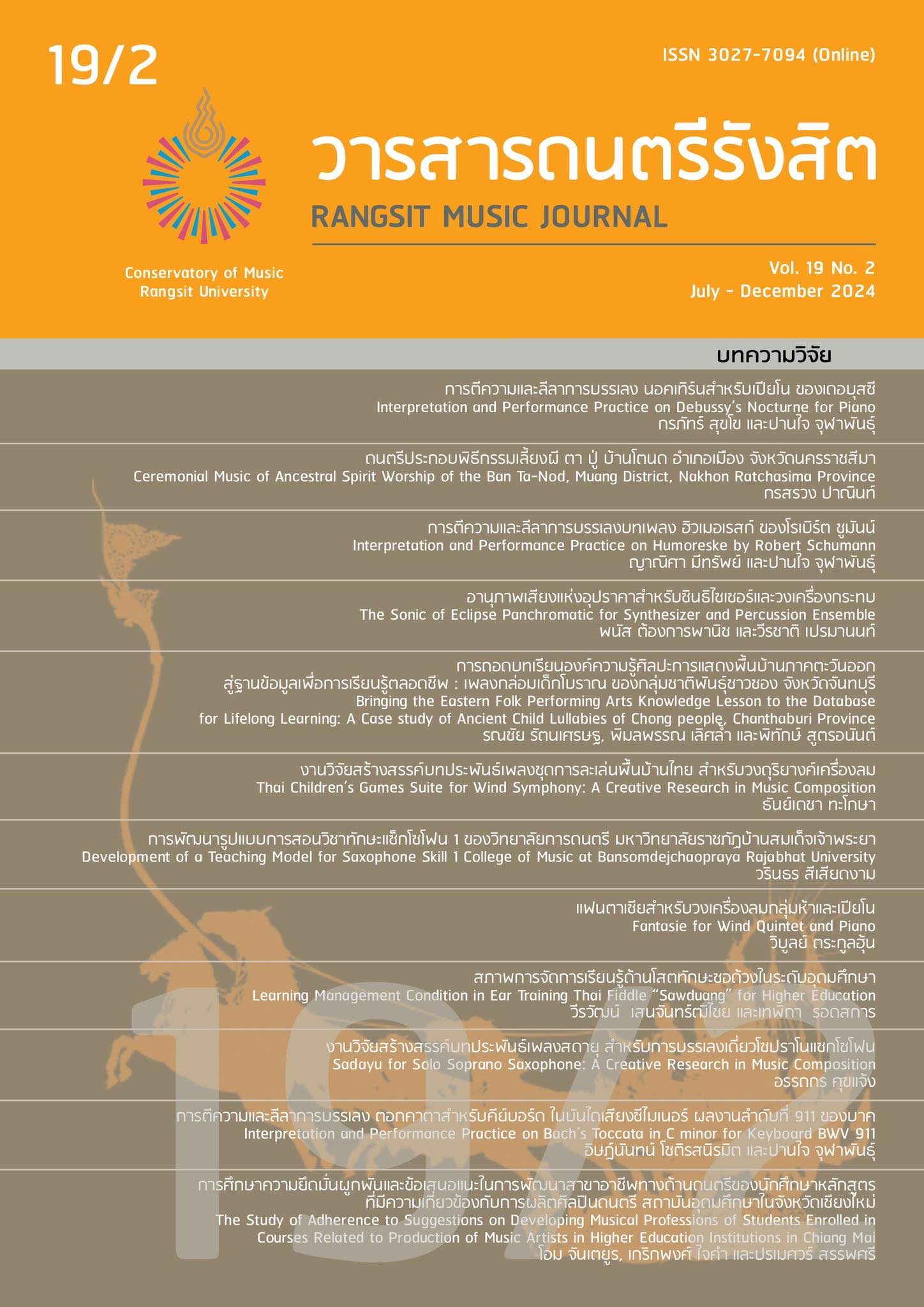The Study of Adherence to Suggestions on Developing Musical Professions of Students Enrolled in Courses Related to Production of Music Artists in Higher Education Institutions in Chiang Mai
DOI:
https://doi.org/10.59796/rmj.V19N2.2024.R1212Keywords:
Adherence, Fields of Music Careers, Music Artist ProductionAbstract
The purpose of this article are 1) to study the adherence to developing musical professions of students enrolled in courses related to production of music artists in higher education institutions in Chiang Mai, and 2) to suggest ways for the development of a program to recruit personnel in music career fields by using a survey to study the facts based on actual situations. The study's results could conclude that; (1) the overall level of adherence among students were at a high level (= 4.13, SD=0.09). The level of adherence in the value of music profession was at a high level (
= 4.26, SD=0.24). The level of adherence in the image of the music profession was at a high level (
= 4.14, SD=0.24). The level of adherence in the performance and service of the music profession was at a high level (
= 4.09, SD=0.37). And, the overall level of adherence in studying in fields of music careers was at a high level (
= 4.05, SD=0.22). (2) There are three categories of ways to suggest the development of a program to recruit personnel in the field of music careers: 1) the development of essential skills for students; 2) the preparation of fundamental factors that enhance educational quality; and 3) the implementation of effective and varied extracurricular activities.
References
Chanteyoon, Ohm, and Krerkpong Jaikum. “The Study of Impact of the COVID-19 Pandemic and Self-adjustment of Lanna Traditional Singing Artist in Chiang Mai Province.” Payap University Journal 32, 2 (2022): 18-31. (in Thai)
Charoensook, Sugree. Talent Education. Bangkok: Chone Charoen Press, 2001. (in Thai)
Chiang Mai Rajabhat University. Bachelor of Fine and Applied Arts Program in Western Music. Chiang Mai: Faculty of Humanities and Social Sciences, Chiang Mai Rajabhat University, 2021. (in Thai)
Florida National University. “The Benefits of Studying with Music.” Accessed June 3, 2019. https://www.fnu.edu/benefits-studying-music/.
Hanteerapitak, Surasak. “Music Education Curriculum Development Bachelor Degree of Rajabhat University in the Northeast Thailand.” DMus diss., Mahasarakham University, 2021. (in Thai)
Jaikum, Krerkpong. “Creating Media for Practicing Ear Training Skills by Using E-Learning. A Case Study: MUA104 Sight-Reading and Dictation II at The College of Music, Payap University.” MMus thesis, Payap University, 2014. (in Thai)
Jaikum, Krerkpong. “The Guidelines of Judgement and Evaluation of the Graduate Studies’ Thesis in Music in Thailand.” DMus diss., Mahidol University, 2020. (in Thai)
Jaikum, Krerkpong. “The Relationship between the Fundamentals of Human Resource Development and Adherence to Teacher Profession of the Bachelor of Music Education Students, Faculty of Education, Chiang Mai Rajabhat University.” CMU Journal of Education 6, 2 (2022): 91-104. (in Thai)
National Association for Music Education. “Important Benefits of Music in Our Schools.” Accessed June 9, 2019. https://nafme.org/important-benefits-of-music-in-our-schools/.
Paralta, Lia. “Benefits of Music to the Brain.” Accessed June 2, 2019. https://www.savethemusic.org/blog/research/benefits-to-the-brain/.
Songsakul, Ponlawut. “The Crisis of Undergraduates Most Unable to Seek Employment.” Accessed June 5, 2022. https://thestandard.co/bachelor-degree-job-finding-crisis/. (in Thai)
Downloads
Published
How to Cite
Issue
Section
License
Copyright (c) 2024 Rangsit Music Journal

This work is licensed under a Creative Commons Attribution-NonCommercial-NoDerivatives 4.0 International License.







